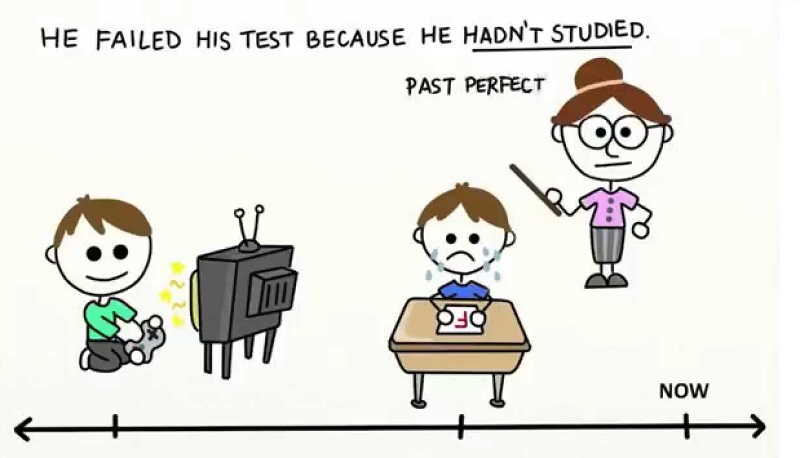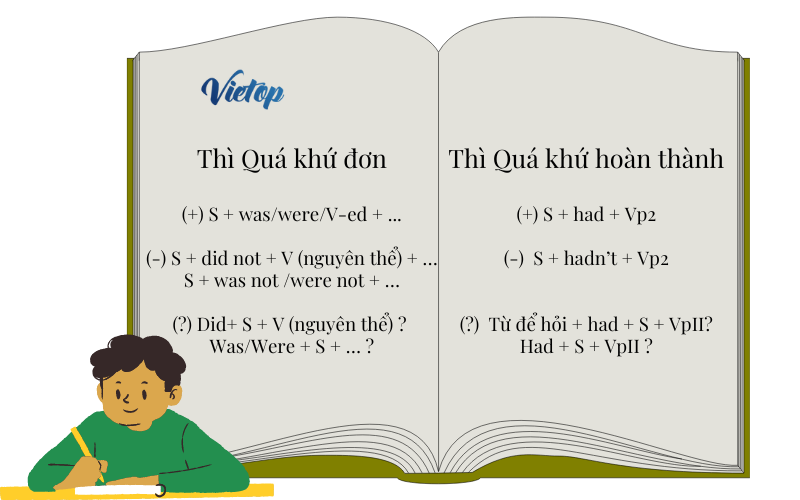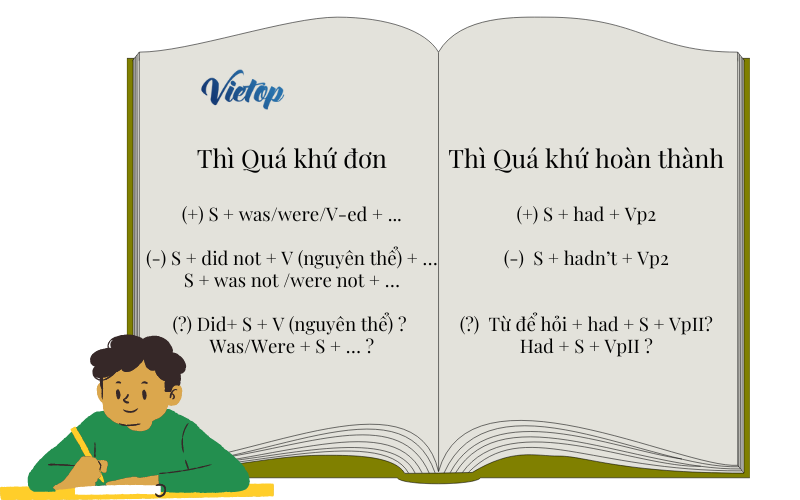Thì thừa khứ solo và vượt khứ ngừng là hai thì rất đặc biệt không chỉ trong những bài thi giờ Anh như TOIEC, IELTS, … hơn nữa trong tiếp xúc hằng ngày. Hai thì này thường đi cùng nhau và gồm sự linh hoạt. Do thế, nhiều người dân học tốt nhầm lẫn với mắc sai lầm. Từ bây giờ hãy thuộc Luyện thi IELTS Vietop ôn lại kỹ hơn Thì quá khứ đối chọi và thừa khứ xong xuôi nhé!
So sánh Thì vượt khứ 1-1 và quá khứ trả thành
Khi diễn tả những hành vi đã xảy ra trong quá khứ, thì vượt khứ solo và vượt khứ chấm dứt là hai thì hay được sử dụng nhất.
Bạn đang xem: Cách dùng thì quá khứ đơn và quá khứ hoàn thành



| Quá khứ đơn | Quá khứ trả thành | |
| Câu khẳng định | S + was/were/V-ed + …E.g.:Bob bought a dozen eggs last week. (Bob tải một tá trứng tuần trước).I was so sleepy but I couldn’t sleep last night. (Tôi đang rất bi thảm ngủ nhưng tôi cấp thiết ngủ về tối qua). | S + had + Vp2E.g.: The film had ended before we arrived at the cinema? (Bộ phim xong xuôi trước khi họ tới rạp chiếu phim). |
| Câu đậy định | – S + did not + V (nguyên thể) + …– S + was not /were not + …did not = didn’t)was not = wasn’t were not = weren’t E.g.:My grandmother didn’t study at university when she was young. (Bà tôi không học đại học khi bà còn trẻ).She wasn’t at home yesterday. (Cô ấy không ở nhà vào đêm qua). | S + hadn’t + Vp2E.g.: The teacher hadn’t come when I arrived at the class. (Giáo viên chưa đến lớp khi tôi vào lớp). |
| Câu nghi vấn | Câu không tồn tại từ nhằm hỏi:Did+ S + V (nguyên thể) ? Was/Were + S + … ?Trả lời: Yes, S + did/was/were.Hoặc: No, S + didn’t/wasn’t/weren’t.Câu bao gồm từ nhằm hỏi:Từ để hỏi + did + S + V (nguyên thể)?Từ nhằm hỏi + was/were + S + … ?E.g.: Did you talk to your friend about your plan? (Bạn vẫn nói với đồng đội về kế hoạch của người sử dụng chưa?)=> Yes, I did. (Có, tôi nói rồi).Were you absent this morning? (Bạn đang vắng vào sáng hôm nay à?)No, I wasn’t (Tôi không).Why did you vì chưng that? (Tại sao các bạn làm thế?). | Câu có từ nhằm hỏi: Từ để hỏi + had + S + VpII?Câu không có từ nhằm hỏi:Had + S + VpII ?Trả lời: Yes, S + had.Hoặc: No, S + hadn’t/had not.E.g.: Had Jessi paid you money before she left? (Jessi vẫn trả tiền trước lúc rời đi chưa?). => No, she hadn’t. (Chưa).Where had they gone before we filmed? (Họ đã từng đi đâu trước khi bọn họ ghi hình?). |
Dấu hiệu nhận thấy Thì vượt khứ solo và vượt khứ hoàn thành
Thì thừa khứ đơn
Yesterday, ago, last (week, year, month), in the past, the day before, …E.g: I started working here 3 years ago. (Tôi ban đầu làm việc tại chỗ này 3 năm trước).
Những khoảng thời hạn đã qua trong thời gian ngày (today, this morning, this afternoon).E.g: The calendar got wet this morning. (Cuốn lịch bị ướt vào sáng nay).
Sau as if, as though (như thể là), it’s time (đã mang đến lúc), if only, wish (ước gì), would sooner/ rather (thích hơn).E.g: John runs so fast as though/ as if he was an athlete. (John chạy nhanh như thể là đi lại viên vậy).
It’s time the conversation ended. (Đã mang lại lúc cuộc trò chuyện ngừng rồi).
I wish I were rich. (Tôi ước tôi giàu).
James would rather her husband was in the military. (James muốn ông chồng mình vào quân nhóm hơn).
Thì vượt khứ trả thành
Before, after, when, by the time, by the end of + thời gian trong quá khứ …E.g: By the time the train arrived, I had been there. (Vào lúc chuyến tàu cho thì tôi sẽ ở kia rồi).
I reached the bus stop after the bus had left. (Tôi đến điểm dừng xe cộ buýt sau khoản thời gian xe buýt đang rời đi).
After the teacher had left, the students talked a lot. (Sau khi gia sư rời đi, học viên nói chuyện vô cùng nhiều).
By the kết thúc of last week, I had finished the sweater I made by hand. (Vào cuối tuần trước, tôi đã kết thúc chiếc áo len ấm tôi làm bởi tay).
Bài tập Thì quá khứ đối chọi và thừa khứ xong xuôi có đáp án
Bài tập
Bài 1: Điền dạng đúng của rượu cồn từ với thì vượt khứ đối chọi hoặc quá khứ trả thành.
1. After they ………… (see) the Tower, they ………… (go) lớn Westminster Abbey.
2. He ………… (ask) me which animals I ………… (see) in Africa.
3. After Columbus ………… (discover) America, he ………… (return) to lớn Spain.
4. Before they ………… (move) lớn Liverpool, they ………… (sell) everything.
5. After he ………… (work) very hard, he ………… (fall) ill.
Xem thêm: Cách Dùng Nước Hoa Thơm Phòng Dạng Que Tán, Nước Hoa Thơm Phòng Sawaday Nhật Bản
6. She ………… (open) the box after she ………… (find) the key.
7. They ………… (go) khổng lồ a restaurant after they ………… (sail).
8. Before they ………… (start) the party, they ………… (invite) some friends.
9. After she ………… (wash) the curtains, she ………… (clean) the windows.
10. They ………… (go) for a sightseeing tour after the bus ………… (arrive).
11. Before he ………… (mow) the lawn, he ………… (pick) some roses.
12. After he ………… (finish) school, he ………… (work) for a magazine.
13. They ………… (drink) a cup of tea after they ………… (finish) lunch.
14. He ………… (ask) me for her telephone number before he ………… (phone) her.
15. My sister ………… (eat) all the chocolate before my parents ………… (come) home.
Bài 2: Điền dạng đúng của đụng từ.
1. We had already eaten when John ………… (come) home.
2. Last year Juan ………… (pass) all his exams.
3. When I ………… (get) lớn the airport, I discovered I had forgotten my passport.
4. I went to lớn the library, then I ………… (buy) some milk………… và went home.
5. I opened my handbag to lớn find that I ………… (forgot) my credit card.
6. When we ………… (arrive) at the station, the train had already left.
7. We got trang chủ to find that someone ………… (break) into the house.
8. I opened the fridge lớn find someone………… (eat) all my chocolate.
9. I had known my husband for three years when we ………… (get) married.
10. Julie was very pleased to lớn see that John………… (clean) the kitchen.
Bài 3: Điền dạng đúng của động từ cùng với thì quá khứ đối kháng hoặc quá khứ trả thành.
1. After Fred ………… (to spend) his holiday in Italy he ………… (to want) to learn Italian.
2. Jill ………… (to phone) Dad at work before she ………… (to leave) for her trip.
3. Susan ………… (to turn on) the radio after she ………… (to wash) the dishes.
4. When she ………… (to arrive) the match ………… already ………… (to start).
5. After the man ………… (to come) home he ………… (to feed) the cat.
6. Before he ………… (to sing) a tuy vậy he ………… (to play) the guitar.
7. She ………… (to watch) a video clip after the children ………… (to go) lớn bed.
8. After Eric ………… (to make) breakfast he ………… (to phone) his friend.
9. I ………… (to be) very tired because I ………… (to study) too much.
10. They ………… (to ride) their bikes before they ………… (to meet) their friends.
Đáp án
Bài 1:
had seen – wentasked – had seenhad discovered – returnedmoved – had soldhad worked – fellopened – had foundwent – had sailedstarted – had invitedhad washed – cleanedwent – had arrivedmowed – had pickedhad finished – workeddrank – had finishedhad asked – phonedhad eaten – cameBài 2:
We had already eaten when John came home.Last year Juan passed all his exams.When I got to the airport, I discovered I had forgotten my passport.I went khổng lồ the library, then I bought some milk & went home.I opened my handbag khổng lồ find that I had forgotten my credit card.When we arrived at the station, the train had already left.We got home to find that someone had broken into the house.I opened the fridge to lớn find someone had eaten all my chocolate.9. I had known my husband for three years when we got married.Julie was very pleased lớn see that John had cleaned the kitchen.Bài 3:
had spent – wantedhad phoned – leftturned on – had washedarrived – had already startedhad come – fedsang – had playedwatched – had gonehad made – phonedwas – had studiedhad ridden – metTrên đây là toàn bộ lý thuyết và bài bác tập về Thì thừa khứ đơn và vượt khứ trả thành. Hy vọng bạn đã vậy chắc ngữ pháp về hai thì này. Vietop chúc bạn thành công!













